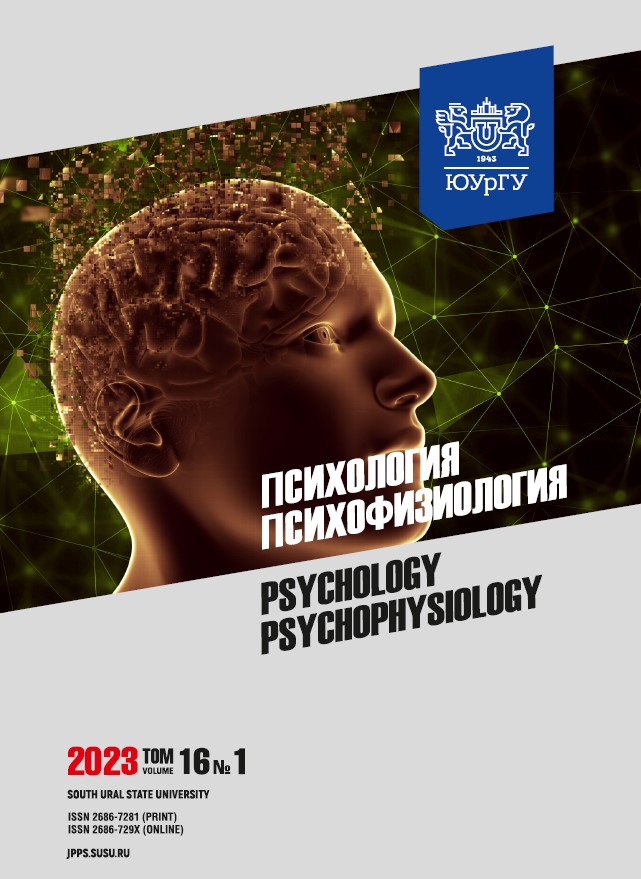The influence of COVID-19 on some psychophysiological parameters of medical students
Abstract
Introduction: there is enough data on the negative influence of the new coronavirus infection on physical, mental, and social well-being. COVID-related changes in the central nervous system and components of mental health are the most relevant, along with autonomic disorders. Aims: this paper was aimed at identifying the impact of COVID-19 on some psychophysiological parameters in medical students. Materials and methods: the study involved male students from 19 to 20 years of age. The first group consisted of people with a history of coronavirus infection (n = 50), and the second group consisted of those who did not have it (n = 50). The following parameters were measured: anxiety, well-being, activity, mood, attention, short-term visual memory, auditory memory, and visual-motor response. The severity and duration of COVID-19 were established with a special questionnaire. Statistical processing of data was performed in the Statistica 6.1 program. Results: there were significantly more respondents with high personal anxiety among people with a history of COVID-19. Changes in well-being, activity, and mood typical of subjects from this group indicated increased fatigue. This was confirmed by lower performance in the Assessment of attention test, which indicated the onset of fatigue. The volume of short-term auditory memory was significantly lower in students with a history of COVID-19 compared to those who did not have COVID-19. The results obtained in the simple visual-motor response test showed no significant differences in the activation of the central nervous system between groups. The results obtained in the test with light stimuli showed differences in the stability of responses. Conclusion: significant differences in some psychophysiological parameters of second-year medical students with a history of COVID-19 compared to the control group confirmed that coronavirus infection affected cognitive functions. In particular, in this population, this can result in reduced academic performance
Downloads
References
2. Pelin A.I., Mukhametova N.N., Fakhrutdinova A.R., Badrutdinova A.A. Prevalence of cog-nitive and autonomic nervous system disorders among COVID-19 students. Modern Science. 2022;3-2:232–236. (in Russ.).
3. Schnitzler L., Janssen L.M.M., Evers S.M.A.A. The broader societal impacts of COVID-19 and the growing importance of capturing these in health economic analyses. International Journal of Technology Assessment in Health Care. 2021;37:e43. DOI: http://doi.org/10.1017/S0266462321000155
4. Shakirova A.T., Koibagarova A.A., Osmonaliev M.K., Akhmedov M.T., Ibraimova A.Dzh. Impact of COVID-19 on the psychological state of people. Evraziiskii Soyuz Uchenykh = Eura-sian Union Of Scientists. 2020;10-3(79):50–53. (in Russ.).
5. Shah S.M.A., Mohammad D., Qureshi M.F.H. et al. Prevalence, psychological responses and associated correlates of depression, anxiety and stress in a global population, during the coro-navirus disease (COVID-19) pandemic. Community Mental Health Journal. 2021;57(1):101–110. DOI: http://doi.org/10.1007/s10597-020-00728-y
6. Fawaz M., Samaha A. E-learning: Depression, anxiety, and stress symptomatology among Lebanese university students during COVID-19 quarantine. Nursing Forum. 2021;56(1):52–57. DOI: http://doi.org/10.1111/nuf.12521
7. Kusumoto Y., Higo R., Ohno K. Differences in college students occupational dysfunction and mental health considering trait and state anxiety during the COVID-19 pandemic. Peer J. 2022;10:e13443. DOI: http://doi.org/10.7717/peerj.13443
8. Giusti L., Mammarella S., Salza A. et al. Predictors of academic performance during the COVID-19 outbreak: impact of distance education on mental health, social cognition and memory abilities in an Italian university student sample. BMC Psychology. 2021;9(1):142. DOI: http://doi.org/10.1186/s40359-021-00649-9
9. Gelyastanov I. Kh. COVID-19: the parallel between cognitive abilities in students. Voprosy kurortologii, fizioterapii i lechebnoi fizicheskoi kultury = Problems of Balneology, Physiotherapy, and Exercise Therapy. 2021;98(3-2):59–60. (in Russ.). DOI: http://doi.org/10.17116/kurort20219803221
10. Henneghan A.M., Lewis K.A., Gill E., Kesler S.R. Cognitive Impairment in Non-critical, Mild-to-Moderate COVID-19 Survivors. Frontiers in Psychology. 2022;13:770459. DOI: http://doi.org/10.3389/fpsyg.2022.770459
11. Huang L., Yao Q., Gu X. et al. 1-year outcomes in hospital survivors with COVID-19: a longitudinal cohort study. Lancet. 2021;398(10302):747–758. DOI: http://doi.org/10.1016/S0140-6736(21)01755-4
12. Becker J.H., Lin J.J., Doernberg M. et al. Assessment of Cognitive Function in Patients After COVID-19 Infection. JAMA Network Open. 2021;4(10):e2130645. DOI: 10.1001/
jamanetworkopen.2021.30645
13. Del Brutto O.H., Wu S., Mera R.M. Cognitive decline among individuals with history of mild symptomatic SARS-CoV-2 infection: A longitudinal prospective study nested to a population cohort. European Journal of Neurology. 2021;28(10):3245–3253. DOI: http://doi.org/10.1111/ene.14775
14. Almeria M., Cejudo J.C., Sotoca J. et al. Cognitive profile following COVID-19 infection: Clinical predictors leading to neuropsychological impairment. Brain, Behavior, and Immunity – Health. 2020;9:100163. DOI: http://doi.org/10.1016/j.bbih.2020.100163
15. Kabysh S.S., Karpenkova A.D., Prokopenko S.V. Cognitive impairments and COVID-19. Sibirskoe meditsinskoe obozrenie = Siberian Medical Review. 2022;2(134):40–48. DOI: http://doi.org/10.20333/25000136-2022-2-40-48
16. Raigorodskii D. Ya. Entsiklopediya psikhodiagnostiki. Psikhodiagnostika vzroslykh [En-cyclopedia of psychodiagnostics. Psychodiagnostics of adults].Samara Bakhrakh-M. 2009:704. (in Russ.).
17. Ignatieva E.V., Kozlova T.A., Belousova K.V., Labazova A.V. A study of personal situa-tional anxiety of first-year students of the faculty of physical culture and sport during selfisola-tioni. Globalnyi nauchnyi potentsial = Global Scientific Potential. 2021;6(123):94–98. (in Russ.).
18. Petrova E.A., Nazarenko V.V. The severity of situational and personal anxiety among university students with disabilities during the pandemic. Konsultativnaya psikhologiya i psikhoterapiya = Counseling Psychology and Psychotherapy. 2021;29(2):48–61. (in Russ.). DOI: http://doi.org/10.17759/cpp.2021290203
19. Bykhovets Yu.V., Kogan-Lerner L.B. Pandemic COVID-19 as a multifactorialtraumatic situation. Sotsialnaya i ekonomicheskaya psikhologiya=Institute of psychology Russian Academy of Sciences Social and economic psychology. 2020;5(2):291–308. (in Russ.). DOI: http://doi.org/10.38098/ipran.sep.2020.18.2.010
20. Tarasevich E.V. Psychoemotional consequences of coronavirus infection. Retsept = Pre-scription. 2022;25(1):76–84. (in Russ.). DOI: http://doi.org/10.34883/PI.2022.25.1.006
21. Woo M.S., Malsy J., Pöttgen J. et al. Frequent neurocognitive deficits after recovery from mild COVID-19. Brain Communications. 2020;2(2):fcaa205. DOI: http://doi.org/10.1093/braincomms/fcaa205
22. Nikolaeva E.N., Kolosova O.N. The assessment of cognitive functions and psychoemo-tional state of students in the conditions of the North. Vestnik Severo-Vostochnogo federalnogo universiteta im. M.K. Ammosova. Seriya: Meditsinskie nauki = Vestnik of North-Eastern Federal University «Medical Sciences». 2021;4(25):22–28. (in Russ.). DOI: http://doi.org/10.25587/SVFU.2021.25.4.003
23. Lamontagne S.J., Winters M.F., Pizzagalli D.A. et al. Post-acute sequelae of COVID-19: Evidence of mood & cognitive impairment. Brain, Behavior, and Immunity – Health. 2021;17:100347. DOI: http://doi.org/10.1016/j.bbih.2021.100347
24. Miners S., Kehoe P.G., Love S. Cognitive impact of COVID-19: looking beyond the short term. Alzheimers Research and Therapy. 2020;12(1):170. DOI: http://doi.org/10.1186/s13195-020-00744-w
References on translit
-Copyright (c) 2023 Psychology. Psychophysiology

This work is licensed under a Creative Commons Attribution-NonCommercial-NoDerivatives 4.0 International License.



